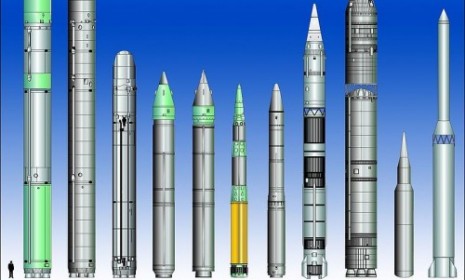Does Obama's nuclear policy make us less safe?
The President has significantly limited the role of nuclear weapons in future defense policy. Will it help rid the world of nukes, or put America in danger?

A free daily email with the biggest news stories of the day – and the best features from TheWeek.com
You are now subscribed
Your newsletter sign-up was successful
President Obama has revamped America's nuclear strategy to dramatically reduce the role of nuclear weapons in future defense policy. The 50-page "Nuclear Posture Review" released Tuesday states explicitly for the first time that the United States "will not use or threaten to use nuclear weapons against non-nuclear weapons states that are party to the Nuclear Non-Proliferation Treaty," not even in response to chemical, biological or cyber attacks. The President hopes the policy will create an incentive for others to give up their weapons. Could Obama's plan make nuclear weapons obsolete — or does it just weaken America's defenses?
This move will make us all less safe: Americans should be "horrified" at this strategy, says Frank J. Gaffney Jr. in the National Review. Such "wooly-headed declaratory policies" only serve to maintain the "steady obsolescence of [America's] deterrent" and the "atrophying of the skilled workforce needed to sustain it." Is "disarming the U.S." really a good idea when not one of the other nuclear states has even considered doing the same?
The Week
Escape your echo chamber. Get the facts behind the news, plus analysis from multiple perspectives.

Sign up for The Week's Free Newsletters
From our morning news briefing to a weekly Good News Newsletter, get the best of The Week delivered directly to your inbox.
From our morning news briefing to a weekly Good News Newsletter, get the best of The Week delivered directly to your inbox.
Finally, a nuclear policy for the post-Cold War age: This is a "big, postive step forward," says Joseph Cirincione, a nuclear nonproliferation expert quoted in Mother Jones. Obama's move marks a transition from the 1940s and the Cold War to the "post 9/11 security environment" and "the elimination of the one weapon that can destroy our nation." The President has finally set the US on a "rational common sense path" towards nuclear disarmament.
"Is Obama pushing Iran toward nuclear weapons?"
It is empty rhetoric — we'll still use nukes if needed: This doesn't change anything, says Stephen M. Walt in Foreign Policy. Our enemies have no particular reason to believe the US will "stick to its declared policy in the event of a crisis." If an unthinkable attack occurred, there is "absolutely nothing to stop the United States from changing its mind." Beyond its limited "public relations value," this "posture review" is "largely meaningless."
"Pros and Cons in the Nuclear Posture Review"
A free daily email with the biggest news stories of the day – and the best features from TheWeek.com
But it's the first step in a long road to a nuke-free world: This policy doesn't amount to disarmament, says an editorial in the Los Angeles Times. Critics shouldn't forget the US approved $7 billion to maintain our nuclear arsenal this year. But this limiting of the role of atomic weapons is "probably as far as the administration can go" towards disarmament with the military on its side. Even for a committed anti-nuclear President like Obama, getting rid of nukes is "a marathon, not a dash."
-
 Bad Bunny’s Super Bowl: A win for unity
Bad Bunny’s Super Bowl: A win for unityFeature The global superstar's halftime show was a celebration for everyone to enjoy
-
 Book reviews: ‘Bonfire of the Murdochs’ and ‘The Typewriter and the Guillotine’
Book reviews: ‘Bonfire of the Murdochs’ and ‘The Typewriter and the Guillotine’Feature New insights into the Murdoch family’s turmoil and a renowned journalist’s time in pre-World War II Paris
-
 Witkoff and Kushner tackle Ukraine, Iran in Geneva
Witkoff and Kushner tackle Ukraine, Iran in GenevaSpeed Read Steve Witkoff and Jared Kushner held negotiations aimed at securing a nuclear deal with Iran and an end to Russia’s war in Ukraine
-
 The billionaires’ wealth tax: a catastrophe for California?
The billionaires’ wealth tax: a catastrophe for California?Talking Point Peter Thiel and Larry Page preparing to change state residency
-
 Bari Weiss’ ‘60 Minutes’ scandal is about more than one report
Bari Weiss’ ‘60 Minutes’ scandal is about more than one reportIN THE SPOTLIGHT By blocking an approved segment on a controversial prison holding US deportees in El Salvador, the editor-in-chief of CBS News has become the main story
-
 Has Zohran Mamdani shown the Democrats how to win again?
Has Zohran Mamdani shown the Democrats how to win again?Today’s Big Question New York City mayoral election touted as victory for left-wing populists but moderate centrist wins elsewhere present more complex path for Democratic Party
-
 Millions turn out for anti-Trump ‘No Kings’ rallies
Millions turn out for anti-Trump ‘No Kings’ ralliesSpeed Read An estimated 7 million people participated, 2 million more than at the first ‘No Kings’ protest in June
-
 Ghislaine Maxwell: angling for a Trump pardon
Ghislaine Maxwell: angling for a Trump pardonTalking Point Convicted sex trafficker's testimony could shed new light on president's links to Jeffrey Epstein
-
 The last words and final moments of 40 presidents
The last words and final moments of 40 presidentsThe Explainer Some are eloquent quotes worthy of the holders of the highest office in the nation, and others... aren't
-
 The JFK files: the truth at last?
The JFK files: the truth at last?In The Spotlight More than 64,000 previously classified documents relating the 1963 assassination of John F. Kennedy have been released by the Trump administration
-
 'Seriously, not literally': how should the world take Donald Trump?
'Seriously, not literally': how should the world take Donald Trump?Today's big question White House rhetoric and reality look likely to become increasingly blurred